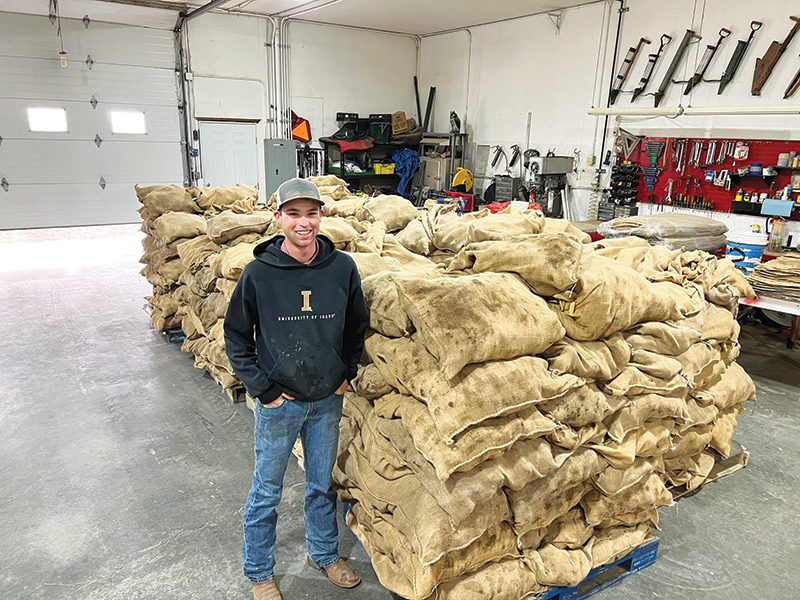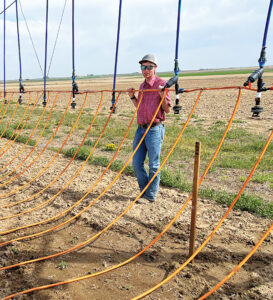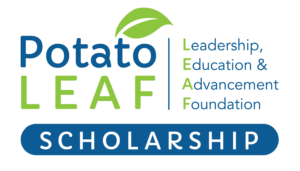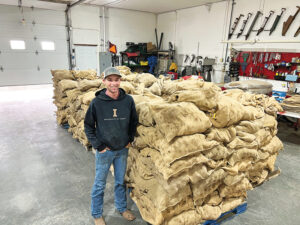
WSU doctoral student has big plans for $10,000 scholarship
An agtech internship his senior year of high school introduced Jacob Meeuwsen to agriculture as a potential career, and that initial interest is now paying dividends.
Meeuwsen, a Ph.D. student at Washington State University (WSU),
is the 2023 recipient of a $10,000 scholarship from the Potato Leadership, Education and Advancement Foundation. His research, under the direction of Mark J. Pavek, a professor at WSU and state potato Extension specialist, focuses on potato water- use efficiency, land-use management practices and reducing water loss via evaporation and runoff.
“I don’t come from a farming family or anything to really do with agriculture,” Meeuwsen told Spudman. “I had an internship with Syngenta during my senior year of high school, which really got me into it. Because of that I studied crop science at University of Idaho and I was introduced via my advisor to Dr. Mark Pavek. That’s how I ended up at WSU within his research program.”

Meeuwsen is currently working to optimize predictive evapotranspiration (ET) and suggested irrigation amounts as they relate to changes in plant spatial arrangement and population and to utilize both to mitigate heat and water stress.
He plans to use information collected from his research to build a predictive evapotranspiration and irrigation app for potatoes.
“I have four in-row spacings — 6, 9, 12 and 15 inches — and I have two row widths — 34 and 32 inches,” he said. “With those treatments, we’ll be able to see how plant population and how the spacing of all those plants affect water use. To look at water use, we have four irrigation treatments, ranging from 120%,100%, 80%, and 60% replacement of predicted ET.”
The Kennewick, Washington native is also testing a novel irrigation method to maximize water use efficiency.
“It’s mobile drip irrigation that connects to the center pivot,” Meeuwsen said. “It pulls drip lines down across the field, which hopefully reduces evaporation relative to overhead irrigation because it’s putting the water right down into the soil and broadcasting water into the open air above the foliage. If that’s the case, then it will hopefully reduce disease pressure, too.”
IMMEDIATE IMPACT
The annual scholarship has been awarded since 1998, originally as a program of the National Potato Council before rolling over to the Potato LEAF Foundation, an NPC subsidiary created in 2019. Mike Wenkel, chief operating officer at NPC and vice president of the LEAF Foundation, said Meeuwsen’s work stood out from seven other applications reviewed by a committee made up of four growers from across the country.
 “They were really excited about the work that Jacob was doing around water use efficiencies, land-use management practices, and trying to develop strategies to reduce water loss in potato production — certainly an important component in potato production, but on top of that, (an issue) that always seems to be front and center of challenges in a lot of our potato production areas,” Wenkel said. “Quite often, we’ll see a lot of proposals that are breeding genetics. There was excitement for what he was doing, that we may see something more quickly that directly, in the short term, impacts production on farms.”
“They were really excited about the work that Jacob was doing around water use efficiencies, land-use management practices, and trying to develop strategies to reduce water loss in potato production — certainly an important component in potato production, but on top of that, (an issue) that always seems to be front and center of challenges in a lot of our potato production areas,” Wenkel said. “Quite often, we’ll see a lot of proposals that are breeding genetics. There was excitement for what he was doing, that we may see something more quickly that directly, in the short term, impacts production on farms.”
Meeuwsen began his Ph.D. research in May 2022. He said he and Pavek decided to apply for the scholarship with the thought that if the work wasn’t chosen, there would be three more chances to receive recognition.
“Jacob has assisted with many WSU research and extension activities.
He is an intelligent team player with great work ethic, routinely exceeding my expectations,” Pavek wrote in his letter of recommendation. “After he graduates, he is interested in continuing his career within PNW agriculture, focusing on potato production.”
As it turned out, there would be no need to wait for the project to turn heads. “When I got the email, I was super ecstatic. I couldn’t stop smiling actually,” Meeuwsen said. “Just knowing that Potato LEAF is acknowledging my research, and because of that, the industry will also see my research, and knowing that I’m actually doing some good is a good feeling and makes it worthwhile.”

Meeuwsen was quick to thank his funding sources — USDA Specialty Crop Block Grant, WSU, Washington State Potato Commission and the Northwest Potato Research Consortium — and said the scholarship will help him complete his research as well as supplement the cost of travel to conferences. He’s unsure of the precise direction of his future in agriculture, but he hopes to continue digging into potatoes.
“I definitely want to stay in research and, if possible, potatoes, just because they’re such a complex crop,” he said. “If I can help growers figure out a way to grow as many potatoes as we grow now with less water while still producing a quality crop for consumers, I think that’s a good feeling.”














